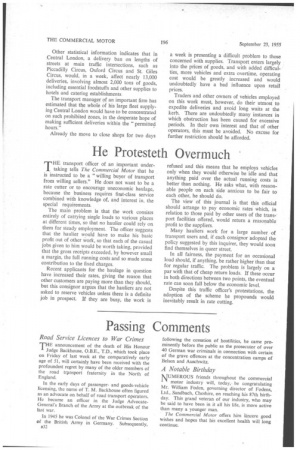He Protesteth Overmuch •
Page 40

If you've noticed an error in this article please click here to report it so we can fix it.
rr HE transport officer of an important under' taking tells The Commercial Motor that he is instructed to be a "willing buyer of transport from willing sellers." He does not want to be a rate cutter or to encourage uneconomic haulage, because the business requires first-class service combined with knowledge of, and interest in, the special requirements.
The main problem is that the work consists entirely of carrying single loads to various places at different times, so that no haulier could rely on them for steady employment. The officer suggests that the haulier would have to make his basic profit out of other Work, so that each of the casual jobs given to him would be worth taking, provided that the gross receipts exceeded, by however small a margin, the full running costs and so made some contribution to the fixed charges.
Recent applicants for the haulage in question have increased their rates, giving the reason that other customers are paying more than they should, but this consignor argues that the hauliers are not asked to reserve vehicles unless there is a definite job in prospect. If they are busy, the work is refused and this means that he employs vehicles only when they would otherwise be idle and that anything paid over the actual running costs is better than nothing. He asks what, with reasonable people on each side anxious to be fair to each other, he should do.
The view of this journal is that this official should arrange to pay economic rates which, in relation to those paid by other users of the transport facilities offered, would return a reasonable profit to the suppliers.
Many hauliers work for a large number of transport users and, if each consignor adopted the policy suggested by this inquirer, they would soon find themselves in queer street.
In all fairness, the payment for an occasional load should, if anything, be rather higher than that for regular traffic. The problem is largely on a par with that of cheap return loads. If these occur in both directions between two points, the eventual rate can soon fall below the economic level.
Despite this traffic officer's protestations, the adoption of the scheme he propounds would inevitably result in rate cutting.
















































































































